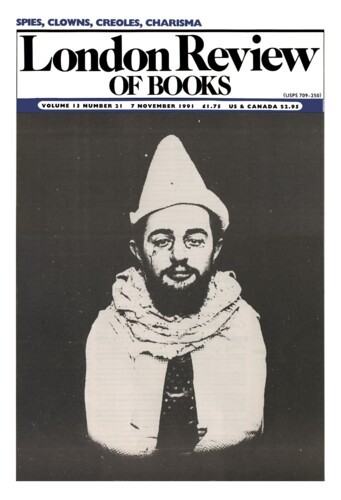Ruling Imbecilities
Andrew Roberts, 7 November 1991
On 11 November 1990 Geoffrey Hill published a Remembrance Day poem entitled ‘Carnival’, in the Sunday Correspondent. The occasion, and the appearance in a national newspaper, suggested the sort of work that a poet laureate might be expected to produce, although Hill’s acerbic satire on contemporary Britain was most unlike the arch public lyrics that Ted Hughes has published since his elevation to that role. The Sunday Correspondent finally folded just over two weeks later. There was, as far as I know, no causal connection between the two events, but the circumstance has a certain ironic appropriateness in the light of Hill’s new volume of critical essays, which takes as its main theme the writer’s struggle with political and financial pressures, and as its principal exemplum the troubled career of the poet laureate, Dryden. In The Enemy’s Country, based on the 1986 Clark Lectures, Hill considers a number of 17th-century writers, including Dryden, Donne, Henry Wotton, Izaac Walton and Hobbes, together with Ezra Pound. The essays focus with characteristic acuity on nuances of style and tone, but Hill is concerned throughout to detect, in writers’ engagements with words, the traces of their engagement with what he terms ‘the world’s business’, from the vicissitudes of Dryden’s relations with patrons and publishers to Pound’s battles against the faults of modern culture as he saw them. In this project, Hill reveals a somewhat Foucauldian sense of words as receivers and transmitters of power, and of language as the site of a remorseless ideological struggle, arguing that ‘the writer’s judgment of word-values both affects and is affected by his understanding of, or his failure to comprehend, the current reckonings of value in the society of his day,’ so that ‘a poet’s words and rhythms are not his utterance so much as his resistance.

